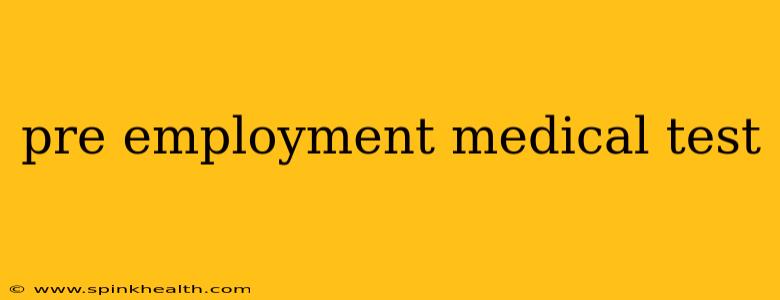The crisp white envelope arrived, a slightly unsettling weight in my hand. Inside, a request for a pre-employment medical examination. My excitement about the new job opportunity warred with a flicker of apprehension. This wasn't just about filling out forms; it was a deeper dive into my health, a peek behind the curtain of my physical well-being. And I wasn't alone. Many people feel the same way. This comprehensive guide will illuminate the process of pre-employment medical tests, answering your questions and easing your concerns.
What types of medical tests are commonly included in pre-employment screenings?
The specific tests included in a pre-employment medical exam vary significantly depending on the job. A desk job will likely have vastly different requirements than a physically demanding role like construction or firefighting. However, some common elements include:
- Urinalysis: This checks for the presence of drugs, infections, or other abnormalities.
- Blood tests: These can assess cholesterol levels, blood sugar, and liver and kidney function. They might also screen for certain diseases.
- Vision and hearing tests: Essential for many roles, particularly those requiring precision or communication.
- Physical examination: A doctor will generally check your blood pressure, heart rate, and overall physical condition. They'll also ask about any pre-existing medical conditions.
- Drug screening: This is increasingly common, particularly in safety-sensitive positions, and usually involves a urine or hair follicle test.
The employer should provide a clear list of the tests to be conducted before the exam. Remember, the purpose of these tests is to assess your ability to safely and effectively perform the job, not to judge your overall health.
Are pre-employment medical tests legal?
The legality of pre-employment medical tests varies slightly depending on the location and specifics of the job. Generally speaking, employers are allowed to conduct these tests, but there are important caveats. The Americans with Disabilities Act (ADA) in the US, and similar legislation in other countries, prohibits discrimination based on disability. This means employers cannot use medical information to unfairly disqualify candidates. They can only ask for information directly related to the essential functions of the job. For instance, a vision test is perfectly acceptable for a pilot, but not necessarily for an accountant. If you have concerns about the legality of a specific test requested by a potential employer, it's always best to seek legal counsel.
When are pre-employment medical tests typically conducted?
The timing of these tests usually falls after a conditional job offer has been made. This means you've successfully navigated the initial interview stages and impressed the hiring manager. The medical exam serves as a final check to ensure you meet the physical requirements of the position.
What if I have a pre-existing medical condition?
This is a crucial point. Honesty is key. Don't try to conceal a pre-existing condition. The employer is obligated to make reasonable accommodations for disabilities, as per the ADA or equivalent legislation in your country. This might involve adjusting work tasks or providing assistive devices. Openly discussing your condition allows the employer to determine whether reasonable accommodations can be made, potentially opening the door to employment. However, it's important to remember that an employer is not obligated to hire you if your condition makes you unable to perform the essential functions of the job, even with reasonable accommodations.
Can I refuse a pre-employment medical test?
You do have the right to refuse a pre-employment medical test, but doing so might have consequences. Depending on the employer and the specific circumstances, it could mean losing your job offer. It's highly recommended to discuss any concerns or reservations with the employer directly before making a decision. There might be room for negotiation or clarification. Seeking legal counsel can also provide guidance on your rights and options in such situations.
Conclusion
Pre-employment medical tests can seem daunting, but understanding the process and your rights can alleviate anxiety. Remember, the tests are designed to ensure your safety and ability to perform the job, not to judge your health. Open communication with the employer and seeking legal advice when necessary can help you navigate this crucial stage in the job application process successfully. Remember, this is a process designed to ensure both your safety and the safety of your workplace. By understanding the process and your rights, you can confidently move forward and embark on your new career journey.

